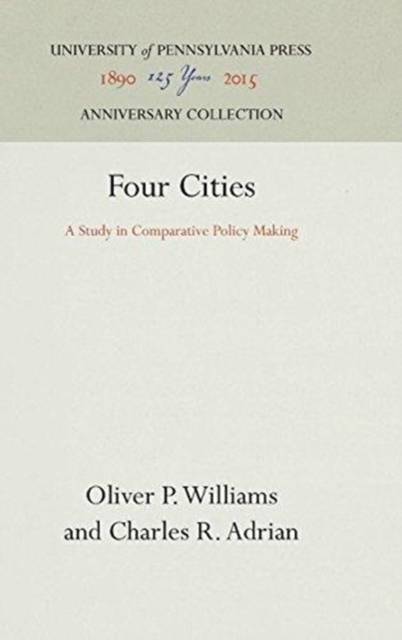
- Retrait gratuit dans votre magasin Club
- 7.000.000 titres dans notre catalogue
- Payer en toute sécurité
- Toujours un magasin près de chez vous
- Retrait gratuit dans votre magasin Club
- 7.000.000 titres dans notre catalogue
- Payer en toute sécurité
- Toujours un magasin près de chez vous
136,95 €
+ 273 points
Description
This book attempts to make a comparative analysis of the political process in four middle-sized American cities over the decade 1948-1957. By holding certain factors constant, explanations were sought for policy variations over this time span and in communities of similar size, ranging in population from 50,000 to 70,000.
Naming their cities by means of the neutral symbols Alpha, Beta, Gamma, and Delta, the authors embarked upon an extensive program of research involving reading back through the daily newspapers of each city over the ten-year period and conducting extensive interviews, principally among those individuals most likely to be conversant with the city's key issues. An examination of the relationship between policy, the policy process, and general community characteristics provided a focus for the analysis of the data. Running through the gamut of civic activities, the cities' responses were found to vary with respect to urban renewal, park systems, pay scales for city employees, inspection services, and sewage disposal systems. A typology of local political values was applied in terms of four factors: economic growth, provision of life's amenities (that is, comforts as well as necessities), maintenance of traditional services only, and arbitrating among conflicting interests. A framework was thus provided for developing a theory of political decisions at the local level. Four Cities is the result and embodiment of this intensive and highly competent study. Its concluding chapters suggest ways in which community characteristics and institutional arrangements are related to the divergent courses cities take to meet their administrative problems, and the descriptive data throughout the book serve to test various generalizations about local politics made in the literature of political science. Anyone interested in city government--whether as a political scientist, urban sociologist, government researcher, or simply as a taxpayer--will find this book useful and enlightening.Spécifications
Parties prenantes
- Auteur(s) :
- Editeur:
Contenu
- Nombre de pages :
- 334
- Langue:
- Anglais
- Collection :
Caractéristiques
- EAN:
- 9780812273816
- Date de parution :
- 29-11-63
- Format:
- Livre relié
- Format numérique:
- Genaaid
- Dimensions :
- 156 mm x 234 mm
- Poids :
- 644 g







